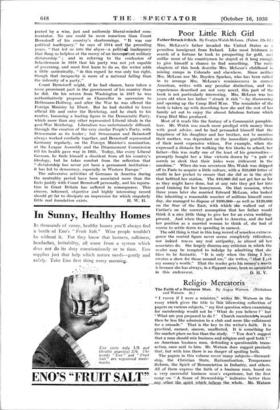Father Struck it Rich. By Evalyn Walsh McLean. (Faber. 12s.
ed.)
Poor Little Rich Girl
MRS. MCLEAN'S father invaded the United States as a penniless immigrant from Ireland. Like most Irishmen in search of a fortune he took to prospecting for gold, and unlike most of his countrymen he stayed at it long enough• to give himself a chance to find something. The early chapters of this book describe Mrs. MeLean's childhood in mining camps in Colorado and elsewhere. Since neither Mrs. McLean nor Mr. Boyden Sparkes, who has been called in to arrange Mrs. McLean's reminiscences in correct American, writes with any peculiar distinction, and the experiences described are not very novel, this part of the book is not particularly interesting. Mrs. McLean was ten years old when her father "struck it rich "—by discovering and opening up the Camp Bird M:ne. The remainder of the book is taken up with describing how she and the rest of her family set out to enjoy the almost fabulous fortune which
Camp Bird Mine produced. .
Most of it reads like the fantasy of a Communist pamphle- teer. Mr. Walsh was much more prodigal with money than with good advice, and he had persuaded himself that the happiness of his daughter and her brother, not to mention their mother, was dependant on the immediate gratification of their most expensive whims. For example, when she expressed a distaste for walking the few blocks to school, her father—this was really one of the least of his generosities— promptly bought her a blue victoria drawn by "" a pair of- sorrels so sleek that their hides were iridescent in the sunshine." When she was seventeen Mrs. Walsh was shipped off to Paris to acquire a little culture, with a $10,000 letter of credit in her pocket to ensure that she did so in the style that befitted her station. The $10,000 did not get her as far as they might have done, but at any rate they got her into good training for her honeymoon. On that occasion, when three years later she married Edward McLean, who looked like inheriting a reasonable number of millions himself some day, she managed to dispose of $200,000—as well as $120,000 on the Star 'of the East, With which-We walked Out of Cartier's on the correct assumption that her father would think it a nice ,little thing to give her for an extra wedding- present. And when they got back to America, and she had her position as a married woman to think of, she had of course to settle down to spending in earnest.
The odd thing is that in this long record of senseless extrava- gance the central figure never seems completely ridiculous, nor indeed roues any real antipathy; is -.alinost all her associates do. She largely disarms any criticism in which the reader may be tempted to indulge by admitting that- likes to be fantastic. "it is only when the thing I buy creates a show for those around me," she writes, "that I get my money's worth." That the reaclergets his money's worth is because she has always, in a flippant sense, been so sueee.ssful




















































 Previous page
Previous page